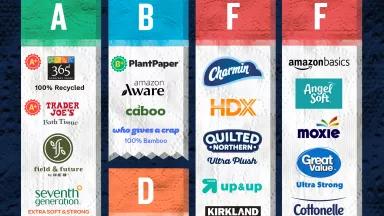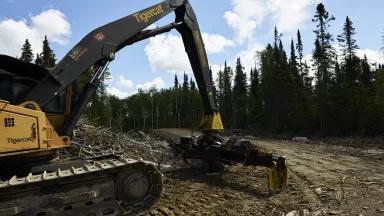
Courtenay Lewis
Many of the products that are most harmful to the world’s forests, and the communities that depend on them, can be found right on the shelves of your local supermarket. From major toilet paper brands sourced from the boreal forest of Canada to dish detergents containing Indonesian palm oil, supermarkets and other retailers profit off countless consumer brands that drive the degradation or loss of critical forests.
These retailers dictate what products are available to shoppers, and they could use their position to put forest- and climate-friendly options front and center for their consumers. Instead, many major retailers like Walmart, Costco, and Home Depot continue push the sale of consumer brands made with harmful “forest-risk commodities”—raw materials and goods known for perpetuating deforestation and forest degradation at a global scale, exacerbating the dual climate and biodiversity crises, and creating harmful consequences for human rights and public health.
In a new report, Selling the World’s Forests: U.S. Retailers Must Advance Urgent Forest Protections to Safeguard the Planet and Their Bottom Line, NRDC highlights the critical role that powerful retailers must play in helping to secure a livable future while combating the mounting financial risks posed by maintaining a business-as-usual approach. The report charts a course of action that retailers should take to avoid fueling deforestation, forest degradation, and the associated human rights abuses in both their direct supply chains and those of the products they sell.
In recent years, many major U.S. retailers have faced public scrutiny for selling consumer goods manufactured with harmful commodities that put forests at risk. In one example from NRDC’s report, Home Depot, Kroger, Lowe’s, and Walmart were spotlighted for continuing to sell tissue brands by Solaris Paper—a manufacturer whose fiber is supplied by Asia Pulp & Paper and affiliated companies—long after the Environmental Paper Network alerted these major retailers of the brands’ ties to tropical peatland deforestation and community rights violations. In another example, Ahold Delhaize, Costco, and Walmart were exposed by the environmental organization Mighty Earth for conducting a combined $3.2 billion in business between 2018 and 2019 with Brazilian meat giant JBS. In turn, JBS’s sourcing helped fuel the intentional burning of millions of acres of Amazon forest to clear land for new cattle and soy feed plantations in 2019, which accelerated biodiversity loss and climate change, violated the rights of local Indigenous Peoples, and led to thousands of people being hospitalized due to air pollution from the fires.
The investment community has also expressed concerns about retailers' ties to forest and climate harms. In recent years, shareholders have passed proposals at Procter & Gamble and Home Depot that asked each company to report on their efforts to eliminate deforestation and the degradation of never-before-logged forests in their supply chains. In another case, shareholders at Costco’s 2022 shareholder meeting passed a proposal introduced by Green Century Capital Management that asked the retailer to account for the “Scope 3” greenhouse gas emissions—the indirect emissions that occur both upstream and downstream in a company’s value chain—associated with all of the products it sells. Major asset managers often hold stock in multiple retail chains, which means their concerns around one company’s practices indicate a high likelihood of further scrutiny around forest impacts across the entire retail space in the years to come.
In addition, the financial risk of not acting is high for retailers, given groundbreaking new regulatory standards and international commitments that will bring about significant marketplace change and improved supply chain due diligence. For example, in 2021, 145 countries committed to halting and reversing deforestation and land degradation by 2030 by signing the Glasgow Leaders’ Declaration on Forests and Land Use. Similarly, in 2023, the European Union passed a deforestation regulation banning imports of certain forest-risk commodities that cause deforestation and forest degradation or that were illegally produced. Multiple U.S. state legislatures—including in California, Illinois, and New York—have also introduced bills requiring that state procurement contracts do not drive deforestation or forest degradation.
In this shifting landscape, retailers should get ahead of consumer, investment, and regulatory movements against negative forest impacts. Doing so will require that they adopt and rapidly implement robust policies (like those outlined in NRDC’s report) that apply to both their direct supply chains and those of the products they sell, and that they foster transparency and civil society engagement around their sourcing practices. These actions should also include providing consumers with alternatives to forest-risk commodities, such as selling 100 percent recycled-content toilet paper options in place of unsustainable forest fiber brands.
Ultimately, U.S. retailers hold significant market power and are capable of mitigating and preventing unsustainable forest supply chains that drive environmental and human rights consequences globally. It’s about time that big retailers put this power to use to protect the future of the planet—and their bottom line.






